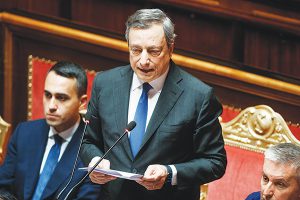Italy is back in crisis, unsurprisingly. The political cycle that started with a populist earthquake in 2018, bringing together fringe forces of the left and right in an unusual coalition, has ended the same way it started — with a bitter shock to the system and market turbulence over the future of Italy. Along the way, it has fuelled the rise of the far-right Brothers of Italy and the fall of Prime Minister Mario Draghi, who was ultimately unable to escape the machinations of Rome. It seems no one, not even the man credited with saving the euro, gets a clean exit from government, no matter how applauded or internationally revered they happen to be. Because in Italy, politics is personal.
For those outside of Italian circles, the move came as a shocker — a political storm in the midst of a war and just hours before a crucial European Central Bank meeting. It will be increasingly hard to shield the country from market shocks of its own making. The crisis started with Giuseppe Conte, the leader of the Five Star party, who precipitated the breakup of the coalition; Matteo Salvini of the League then finished it off by walking out of the confidence vote that would have allowed Draghi to stay in office until the spring.
The irony is that both men were part of the so-called Governo del Cambiamento, the coalition that brought together the League and the Five Star in 2018, which promised to reinvigorate politics. That experiment failed miserably. Italians must understand now that bringing extremes into their core institutions is no better or more efficient than establishment politics. And there needs to some soul searching into what went wrong — and why — before the next election perpetuates bad politics for longer.
There is no denying that the legislature about to end has been beset by constant infighting, backstabbing and personal machinations of the same people that promised to put the nation’s interest before party politics in 2018. The past four years have seen huge ideological swings, enough to anger and confuse Italian voters at each turn.
Draghi offered a short break from the instability, and a vision needed to push through reforms. But the bad politics unleashed by populism runs deep. We’re now in for a brutal election campaign.
It will be an interesting one, though. For once, Italy has no one to blame for the convulsions to come but itself. There is no external enemy to point the finger to. The European Commission has signalled it is willing to work with whatever government comes out of the autumn election. Brussels has also changed since the euro crisis — contrary to what critics argue, policy makers have grown closer. The goodwill from Rome has come a long way, and the constant (largely stereotypical) pontification about Europe’s south has softened. This winter it may be Germany that asks for solidarity to secure energy supplies. How the tables have turned.
Meanwhile, the ECB has shown its willingness and ability to act vigorously to protect the single currency. For all its faults, Italy, a founding member of the euro and the bloc’s third-largest economy, will remain a key part of the monetary puzzle Frankfurt has to work with.
If polls are correct, the next government will likely bring together a right-wing coalition to Palazzo Chigi, the home of the prime minister, led by Brothers of Italy, the League and Silvio Berlusconi’s Forza Italia, which is still hanging around.
One thing to know about Giorgia Meloni, the head of Brothers of Italy, is that her political capital stems from being a force of opposition. She’s popular these days because opposing policy is easier than making tough choices in government. As often happens in politics, once you actually have to make policy, public support dissipates quickly.
Italy also has an extraordinary ability to build and burn politicians. In fact, for Meloni, becoming the next premier — if that were indeed to happen — may prove a poisoned chalice. Her rivals are very aware of this.
In times of political and market stress, it is easy for investors to get agitated. Who can blame them after the latest drama? But it is important to keep in mind that for all the histrionics, Italian institutions have a remarkable ability to adjust, cut losses and save face. To say Italy will crumble or bring back Italexit, crashing the country out of the euro back to the lira, is too simplistic a narrative when times get tough. Indeed, it ignores how much the system — and the Italian business class — work against such an outcome.
Sooner rather than later, Italy will have to ditch the fireworks and focus on the economy. But that will only happen if Italians make it clear with their vote that the populist experiment is over and the country requires serious government.
Maria Tadeo is a Brussels-based reporter for Bloomberg Television where she regularly reports on the continent’s politics and economy
 The Gulf Time Newspaper One of the finest business newspapers in the UAE brought to you by our professional writers and editors.
The Gulf Time Newspaper One of the finest business newspapers in the UAE brought to you by our professional writers and editors.

